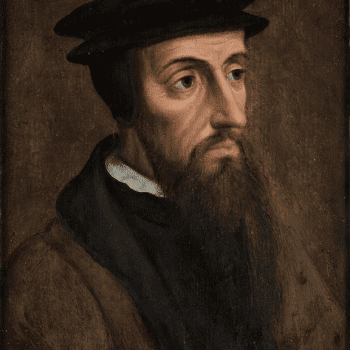There are few places where one can go to study church history more rewarding than Dr. John Piper’s biographical talks. He has a way of opening up the life of a great hero of the faith and showing us what we can learn from them. I’m finding myself in John Owen’s Communion with the Triune God quite consistently at the moment, and am now over half-way through the book. I am finding it to be sweet to the soul and, thanks to Justin & Company, relatively easy going on the eyes!
-732572.jpg) I thought I would have a look at what the modern John has to say about his namesake. Piper begins his biography by emphasizing just how prominent an influence Owen has had in the centuries since his death. He even quotes approvingly those who elevate John Owen above Piper’s other theological hero, Jonathan Edwards! Certainly his list of modern greats who express their debt to Owen is impressive.
I thought I would have a look at what the modern John has to say about his namesake. Piper begins his biography by emphasizing just how prominent an influence Owen has had in the centuries since his death. He even quotes approvingly those who elevate John Owen above Piper’s other theological hero, Jonathan Edwards! Certainly his list of modern greats who express their debt to Owen is impressive.
But what I want to draw your attention to this Friday is the section which speaks about the experiential nature of an event that happened to John Owen years after he had become intellectually convinced of Calvinism. The event below is often described as Owen’s conversion, although Piper, in introdcucing it, expresses some doubt about that. When confronted with events as experiential as those described below, we are faced with a dilemma. Many Christians today never experience this kind of personalized assurance of salvation. For many of those who have come before us, until they knew something of the love of God shed abroad in their own hearts, they could not confidently claim to be Christians.
Thus, one of two conclusions become possible. First, we might infer from reading about previous heroes of the faith that all salvation MUST be accompanied by an experience. Thus, we would have to conclude that many alive today in our churches have never truly been saved. Second, we could infer that while it is possible to become a Christian without any great emotional fireworks being set off, there is a distinct experience of God’s Spirit that is available and brings assurance.
Ironically, a doctrine of a distinct experience of God could, in fact, be necessary precisely to allow for the fact that believers differ in the extent of their awareness of the presence and love of God. Far from creating “second class” Christians, it could be that this doctrine is necessary to ensure that people whose conversion expereince is not as dramatic as those outlined below can still be classed as Christians.
Can anyone read these accounts and be satisfied with an inferior experience of God? Or, like me, does reading them make you yearn for more of God? If the latter, let me encourage you to pray that God will reveal himself personally to you in the way he has to so many others before you. Then, read the Bible, sit under sermons, and continue to trust in God irrespective of what you feel while earnestly seeking the God who loved you so much that he came and died for you.
Let’s see how John Piper describes the conversion of John Owen, which he writes about in a section detailing five events that shaped Owen’s life:
The first is his conversion—or his assurance of salvation and deepening of his personal communion with God.
It is remarkable that it happened in a way almost identical to Charles Spurgeon’s conversion two centuries later. On January 6, 1850 Spurgeon was driven by a snow storm into a Primitive Methodist Chapel where a layman stood in for the pastor and took the text from Isaiah 45:22, “Look to me and be saved, all the ends of the earth.” Spurgeon looked and was saved.
Owen was a convinced Calvinist with large doctrinal knowledge, but he lacked the sense of the reality of his own salvation. That sense of personal reality in all that he wrote was going to make all the difference in the world for Owen in the years to come. So what happened one Sunday in 1642 is very important.
When Owen was 26 years old he went with his cousin to hear the famous Presbyterian, Edmund Calamy, at St. Mary’s Church Aldermanbury. But it turned out Calamy could not preach and a country preacher took his place. Owen’s cousin wanted to leave. But something held Owen to his seat. The simple preacher took as his text Matthew 8:26, “Why are you fearful, O you of little faith?” It was God’s appointed word and appointed time for Owen’s awakening. His doubts and fears and worries as to whether he was truly born anew by the Holy Spirit were gone. He felt himself liberated and adopted as a Son of God. When you read the penetrating practical works of Owen on the work of the Spirit and the nature of true communion with God it is hard to doubt the reality of what God did on this Sunday in 1642.
Later in this biographical article Piper quotes Packer to further elaborate on this vital issue of communion with God:
Packer says that the Puritans differ from evangelicals today because with them “. . . communion with God was a great thing; to evangelicals today it is a comparatively small thing. The Puritans were concerned about communion with God in a way that we are not. The measure of our unconcern is the little that we say about it. When Christians meet, they talk to each other about their Christian work and Christian interests, their Christian acquaintances, the state of the churches, and the problems of theology—but rarely of their daily experience of God.”
But God was seeing to it that Owen and the suffering Puritans of his day lived closer to God and sought after communion with God more earnestly than we. Writing a letter during an illness in 1674 he said to a friend, “Christ is our best friend, and ere long will be our only friend. I pray God with all my heart that I may be weary of everything else but converse and communion with Him.” God was using illness and all the other pressures of Owen’s life to drive him into communion with God and not away from it.
But Owen was also very intentional about his communion with God. He said, “Friendship is most maintained and kept up by visits; and these, the more free and less occasioned by urgent business . . .” In other words, in the midst of all his academic and political and ecclesiastical labors he made many visits to his Friend, Jesus Christ.
And when he went he did not just go with petitions for things or even for deliverance in his many hardships. He went to see his glorious friend and to contemplate his greatness. The last book he wrote—he was finishing it as he died—is called Meditations on the Glory of Christ. That says a great deal about the focus and outcome of Owen’s life. In it he said:
“The revelation . . . of Christ . . . deserves the severest of our thoughts, the best of our meditations and our utmost diligence in them . . . What better preparation can there be for [our future enjoyment of the glory of Christ] than in a constant previous contemplation of that glory in the revelation that is made in the Gospel?”
Lest we be in any doubt about how personally challenging John Piper finds the life of Owen, he states:
“Owen was authentic in commending in public only what he had experienced in private.
One great hindrance to holiness in the ministry of the word is that we are prone to preach and write without pressing
into the things we say and making them real to our own souls. Over the years words begin to come easy, and we find we can speak of mysteries without standing in awe; we can speak of purity without feeling pure; we can speak of zeal without spiritual passion; we can speak of God’s holiness without trembling; we can speak of sin without sorrow; we can speak of heaven without eagerness. And the result is a terrible hardening of the spiritual life.”
Piper goes on to quote Owen as follows:
“A man preacheth that sermon only well unto others which preacheth itself in his own soul. And he that doth not feed on and thrive in the digestion of the food which he provides for others will scarce make it savoury unto them; yea, he knows not but the food he hath provided may be poison, unless he have really tasted of it himself. If the word do not dwell with power in us, it will not pass with power from us.”















